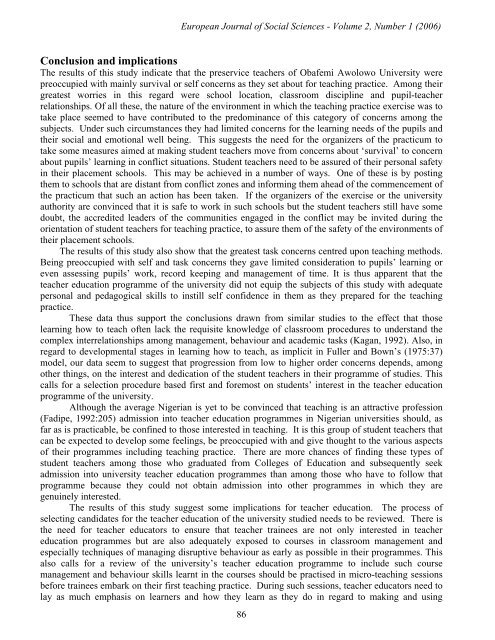EFFECT OF VITAMINS C AND E INTAKE ON BLOOD ... - EuroJournals
EFFECT OF VITAMINS C AND E INTAKE ON BLOOD ... - EuroJournals
EFFECT OF VITAMINS C AND E INTAKE ON BLOOD ... - EuroJournals
Create successful ePaper yourself
Turn your PDF publications into a flip-book with our unique Google optimized e-Paper software.
European Journal of Social Sciences - Volume 2, Number 1 (2006)<br />
Conclusion and implications<br />
The results of this study indicate that the preservice teachers of Obafemi Awolowo University were<br />
preoccupied with mainly survival or self concerns as they set about for teaching practice. Among their<br />
greatest worries in this regard were school location, classroom discipline and pupil-teacher<br />
relationships. Of all these, the nature of the environment in which the teaching practice exercise was to<br />
take place seemed to have contributed to the predominance of this category of concerns among the<br />
subjects. Under such circumstances they had limited concerns for the learning needs of the pupils and<br />
their social and emotional well being. This suggests the need for the organizers of the practicum to<br />
take some measures aimed at making student teachers move from concerns about ‘survival’ to concern<br />
about pupils’ learning in conflict situations. Student teachers need to be assured of their personal safety<br />
in their placement schools. This may be achieved in a number of ways. One of these is by posting<br />
them to schools that are distant from conflict zones and informing them ahead of the commencement of<br />
the practicum that such an action has been taken. If the organizers of the exercise or the university<br />
authority are convinced that it is safe to work in such schools but the student teachers still have some<br />
doubt, the accredited leaders of the communities engaged in the conflict may be invited during the<br />
orientation of student teachers for teaching practice, to assure them of the safety of the environments of<br />
their placement schools.<br />
The results of this study also show that the greatest task concerns centred upon teaching methods.<br />
Being preoccupied with self and task concerns they gave limited consideration to pupils’ learning or<br />
even assessing pupils’ work, record keeping and management of time. It is thus apparent that the<br />
teacher education programme of the university did not equip the subjects of this study with adequate<br />
personal and pedagogical skills to instill self confidence in them as they prepared for the teaching<br />
practice.<br />
These data thus support the conclusions drawn from similar studies to the effect that those<br />
learning how to teach often lack the requisite knowledge of classroom procedures to understand the<br />
complex interrelationships among management, behaviour and academic tasks (Kagan, 1992). Also, in<br />
regard to developmental stages in learning how to teach, as implicit in Fuller and Bown’s (1975:37)<br />
model, our data seem to suggest that progression from low to higher order concerns depends, among<br />
other things, on the interest and dedication of the student teachers in their programme of studies. This<br />
calls for a selection procedure based first and foremost on students’ interest in the teacher education<br />
programme of the university.<br />
Although the average Nigerian is yet to be convinced that teaching is an attractive profession<br />
(Fadipe, 1992:205) admission into teacher education programmes in Nigerian universities should, as<br />
far as is practicable, be confined to those interested in teaching. It is this group of student teachers that<br />
can be expected to develop some feelings, be preoccupied with and give thought to the various aspects<br />
of their programmes including teaching practice. There are more chances of finding these types of<br />
student teachers among those who graduated from Colleges of Education and subsequently seek<br />
admission into university teacher education programmes than among those who have to follow that<br />
programme because they could not obtain admission into other programmes in which they are<br />
genuinely interested.<br />
The results of this study suggest some implications for teacher education. The process of<br />
selecting candidates for the teacher education of the university studied needs to be reviewed. There is<br />
the need for teacher educators to ensure that teacher trainees are not only interested in teacher<br />
education programmes but are also adequately exposed to courses in classroom management and<br />
especially techniques of managing disruptive behaviour as early as possible in their programmes. This<br />
also calls for a review of the university’s teacher education programme to include such course<br />
management and behaviour skills learnt in the courses should be practised in micro-teaching sessions<br />
before trainees embark on their first teaching practice. During such sessions, teacher educators need to<br />
lay as much emphasis on learners and how they learn as they do in regard to making and using<br />
86
















